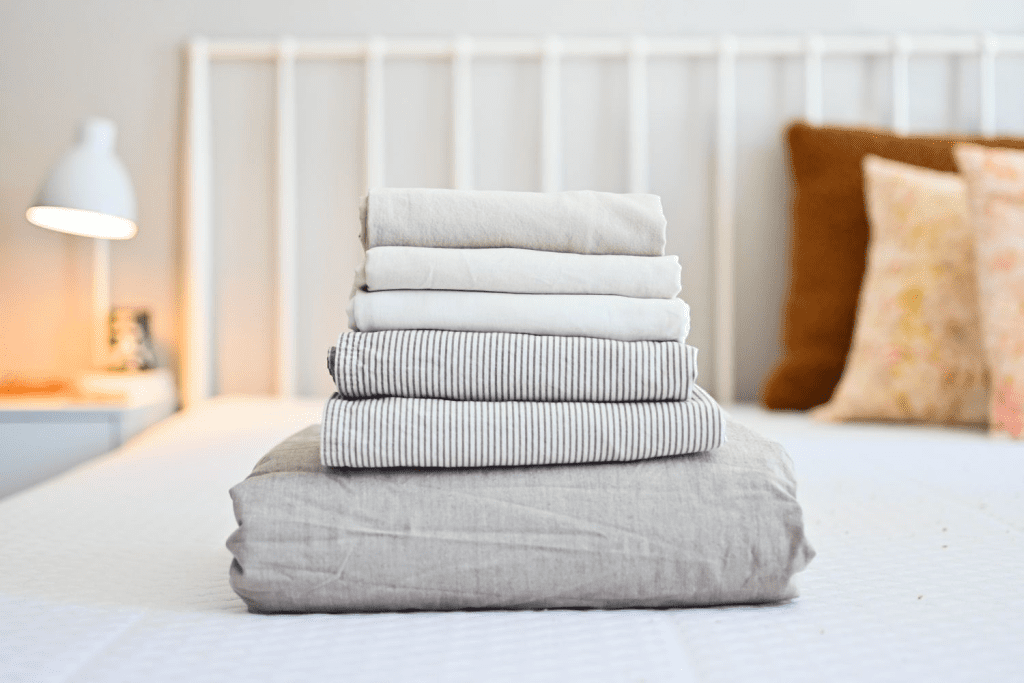Keeping a clean home is essential for both your physical and mental well-being. Among the most crucial elements of cleanliness is your bed, where you spend nearly a third of your life. Your bed sheets, often neglected, play a significant role in your overall health. Dust mites, bacteria, fungi, sweat, and dead skin cells can build up on your sheets over time, leading to potential health issues if not properly addressed.
The Recommended Frequency for Washing Sheets

Experts typically recommend washing your bed sheets once a week. This weekly washing schedule helps ensure that you’re eliminating dust, bacteria, and other contaminants that can accumulate quickly. If you’re not adhering to this frequency, you might be surprised by how much builds up between washes!
However, a few factors could cause you to wash your sheets more often:
- Allergies: If you suffer from allergies—especially to dust mites—you might want to wash your sheets more frequently to avoid triggering allergy symptoms.
- Night Sweats: Those who sweat a lot during sleep should consider washing their sheets more frequently to maintain cleanliness and comfort.
- Illness: If you’ve been sick, it’s essential to wash your sheets more often to avoid spreading germs and re-infecting yourself.
- Pets: If you let pets sleep on your bed, you should wash your sheets more regularly. Pets bring extra dirt, dander, and even fleas, which can all end up on your bedding.
Personal Hygiene and Its Impact on Sheet Cleanliness
Believe it or not, your own cleanliness before bed plays a big role in how often your sheets need to be washed. If you shower every night before hitting the sheets, they’ll stay cleaner for longer. On the other hand, if you often climb into bed without a nightly shower, the oils and dirt from your body can accumulate faster on your sheets.
How Climate Affects Sheet Washing Frequency
The climate where you live can also dictate how often you should wash your sheets. In hotter, more humid environments, you’re more likely to sweat, which will require you to wash your sheets more frequently. During colder months, when you’re sweating less and spending more time wrapped in blankets, you might be able to stretch your washing schedule a little longer.
The Importance of Fabric Types
The type of fabric your sheets are made from can also affect how often they need washing. Breathable fabrics like cotton tend to stay cleaner for longer because they allow air to flow more freely. Polyester or other synthetic materials can trap more moisture and bacteria, requiring more frequent washing to keep them fresh.
What Happens When You Don’t Wash Your Sheets Regularly
Skipping regular washes can lead to several unpleasant consequences that go beyond just dirty sheets.
- Skin Irritations: Unwashed sheets can lead to skin problems, such as acne or rashes, due to bacteria and oils transferring from your body to the fabric.
- Respiratory Issues: Dust mites love unwashed bedding. Their waste products can trigger allergies and even exacerbate asthma.
- General Hygiene Issues: Over time, sheets can harbor bacteria, fungi, and other pathogens that can lead to health issues. For example, dirty sheets can contribute to fungal infections, particularly in more humid climates.
Proper Washing Techniques to Maximize Cleanliness

Washing your sheets the right way is just as important as washing them often. To effectively remove germs, allergens, and dirt, follow these expert-recommended washing techniques:
- Use Hot Water: Check the care label on your sheets, and always wash them at the hottest temperature allowed. This helps to kill bacteria and dust mites effectively.
- Choose a Mild Detergent: A gentle detergent is preferable, as harsh chemicals can irritate your skin, especially if you have sensitive skin.
- Don’t Overload the Washer: Make sure your washing machine isn’t too full. Sheets need space to move around in the drum to be cleaned thoroughly.
- Dry Thoroughly: If your sheets can handle high heat, tumble dry them on a hot setting to kill any dust mites that survived the wash.
- Whitening Tips for Light-Colored Sheets: For white or light-colored sheets, consider using bleach to sanitize them even further. Be sure to follow the care instructions to avoid damaging the fabric.
The Consequences of Poor Sheet Maintenance
Neglecting to clean your sheets regularly can have negative effects on both your health and your quality of sleep. Dirty sheets aren’t just uncomfortable; they can be hazardous to your well-being. Bacteria, fungi, and allergens that build up on your bedding can trigger a range of health problems, from simple skin irritations to more serious respiratory issues.

It’s important to recognize that sleeping in a clean environment promotes better rest, while also preventing potential health issues. A little bit of extra effort in keeping your sheets clean can go a long way in improving your overall well-being.
Conclusion
In summary, washing your bed sheets once a week is the golden rule for maintaining a clean, healthy sleeping environment. However, individual factors like personal hygiene, climate, pets, and health conditions might call for more frequent washes. Clean sheets are not just about a fresh smell and feel—they’re about protecting yourself from bacteria, allergens, and dust mites that could negatively affect your health.
By sticking to a proper washing schedule and using the right techniques, you can enjoy a cleaner, more comfortable sleep environment that keeps you healthy and happy. So, make it a priority to toss those sheets in the wash every week—you’ll thank yourself later!


